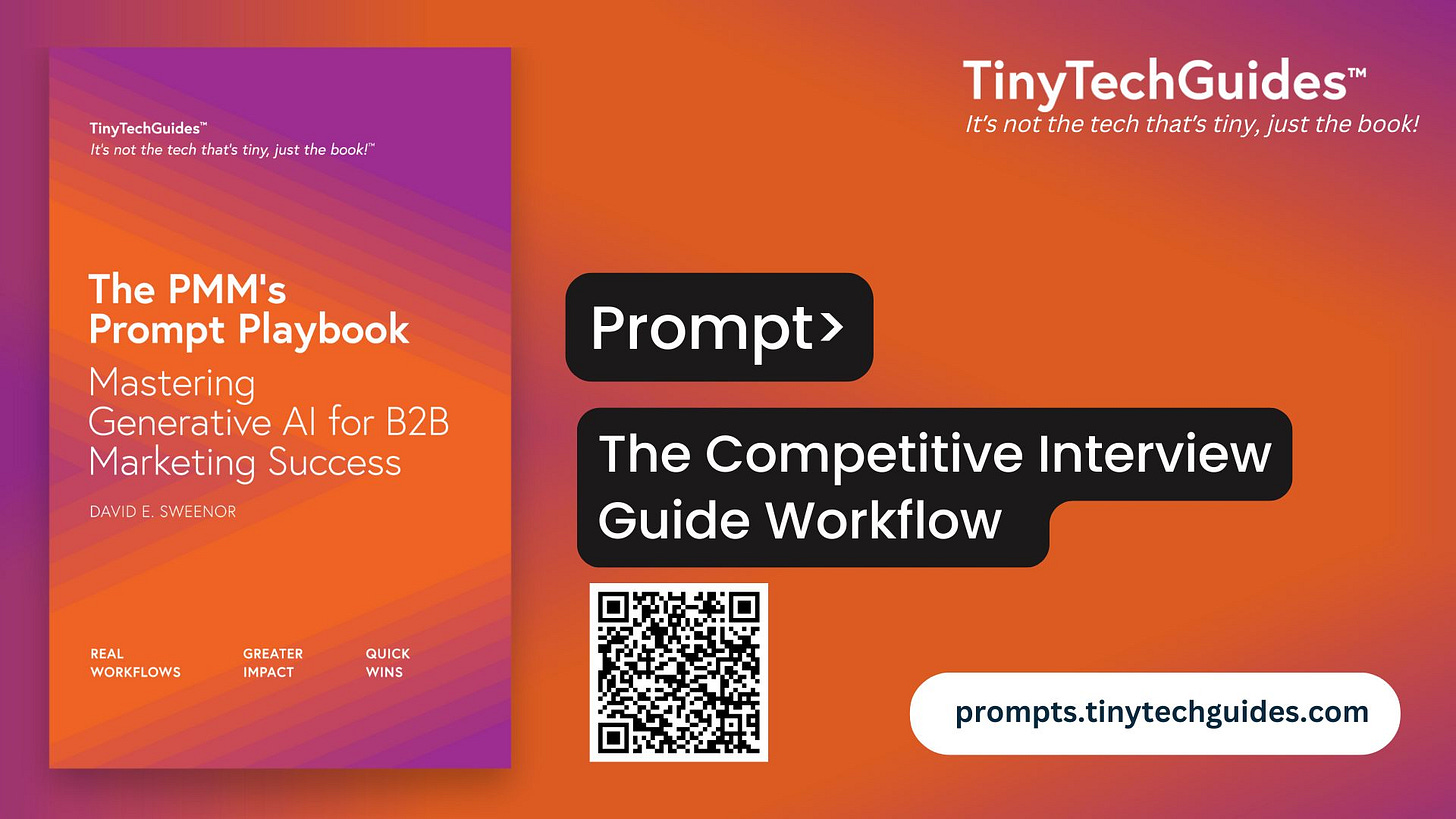The Competitive Interview Guide Workflow
Turn customer feedback into validated messaging — and uncover which claims actually resonate in the market.
This prompt is not part of The PMM’s Prompt Playbook which has 30 ready-to-use prompts. If you’re looking for more cut-and-paste prompts, join the Substack! Paid subscribers receive new cut-and-paste prompts every week.
Get the PMM’s Prompt Playbook and Modern B2B Marketing today!
Need help with product marketing or prompts? Let me know.
Workflow Name: Interview Guide Builder: Validate Competitive Claims with Customers & Prospects
created by prompts.tinytechguides.com
What this Workflow Does:
This workflow builds a structured, persona-specific interview guide designed to help internal teams gather real-world feedback on competitive claims. Whether you’re talking to current customers or lost deals, the guide helps you probe for insights on what claims resonate, which fall flat, and how your positioning stacks up in the wild. Ideal for PMM, sales enablement, or anyone lookin’ to keep it real with the market.
Workflow Steps Summary:
Step 0: Define Inputs
Step 1: Identify Competitive Claims to Validate
Step 2: Define Interview Audience (Customers vs Prospects)
Step 3: Draft Core Interview Questions
Step 4: Add Probing Questions Based on Personas
Step 5: Define Interview Flow (Intro → Claims → Wrap-up)
Step 6: Generate Interview Guide Output
Step 0: Define Inputs
{product_or_solution} = The product, service, or solution whose competitive claims you’re validating
{industry} = The main industry or vertical focus (e.g., Fintech, Healthcare, SaaS)
{competitive_claims} = Specific competitive claims or differentiators you want to validate (e.g., “faster implementation than Competitor X”)
{interview_type} = Who you’re interviewing (e.g., current customers, recent lost prospects, open opps)
{persona} = The main persona(s) you’ll be interviewing (e.g., CIO, Operations Manager, End User)
{desired_outcome} = What you want to learn or validate from these interviews (e.g., messaging resonance, real-world performance, objection handling)
{interview_style} = Preferred style or tone (e.g., casual convo, structured Q&A, open-ended discovery)
Step 1: Identify Competitive Claims to Validate
#Role
You are a Product Marketing Manager responsible for competitive positioning and messaging.
#Context
You are preparing an interview guide to validate specific competitive claims for {product_or_solution} in the {industry} industry. These claims may come from internal sales feedback, win/loss analysis, or positioning decks.
#Task
List and prioritize 3–5 competitive claims or differentiators you want to test with interviewees. Include a short rationale for each.
#Format
Return a bullet list with each claim followed by a short rationale.
#Tone
Professional but curious — you want to get to the heart of what really matters in the market.
Step 2: Define Interview Audience
#Role
You are a Customer Research Strategist helping internal teams clarify who to interview for maximum insight.
#Context
The interview objective is to validate competitive claims about {product_or_solution} by speaking with people in the {industry} industry.
#Task
Based on the provided {interview_type} and {persona}, define:
- Who should be interviewed
- Why their perspective matters
- The ideal number of participants per type
#Format
Output a short paragraph followed by a table with columns: Persona | Interview Type | Why They’re Important | Suggested Quantity
#Tone
Strategic and pragmatic.
Step 3: Draft Core Interview Questions
#Role
You are a B2B interview designer focused on extracting high-value insights from customer conversations.
#Context
You are designing interview questions to validate competitive claims for {product_or_solution} in the {industry} space. These questions should work for the {interview_type} and {persona}, and uncover how your solution compares to competitors.
#Task
Draft 5–7 core interview questions that explore the customer’s perception of your product, competitor solutions, and key decision factors.
#Format
List questions in bullet format. Include one sentence below each question that explains the purpose behind it.
#Tone
Curious, conversational, and neutral (no leading questions).



